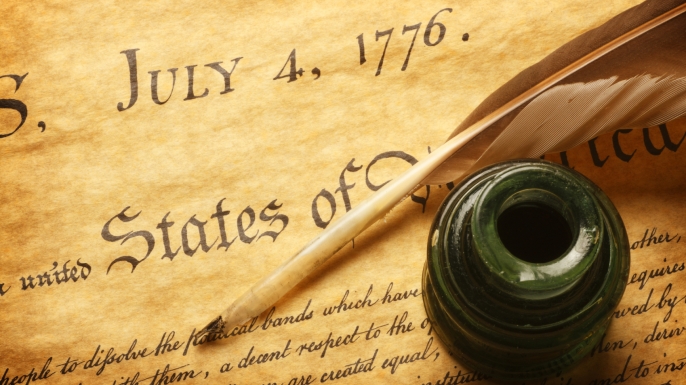 In recent years, Americans and observers worldwide have been captivated by the turmoil within the United States (US) concerning its intense partisan politics. At the same time, media pundits have failed to adequately explain the nature and causes of the political power struggle that continues to challenge the principles of democracy.
In recent years, Americans and observers worldwide have been captivated by the turmoil within the United States (US) concerning its intense partisan politics. At the same time, media pundits have failed to adequately explain the nature and causes of the political power struggle that continues to challenge the principles of democracy.
Astrologers, however, understand the uniqueness of our times when noting several dynamic aspects1 that have been activating the potentials of the July 4, 1776 birth chart of the United States. The aspects are the April 5, 2017, US progressed Mercury station that synchronized with the commencement of the Trump administration, the present transit of Pluto now well within the parameters of its 248-year pilgrimage-return to its natal degree, and the progressed Moon aspects from 2021 to 2024.
THE UNITED STATES HOROSCOPE
The horoscope of a nation carries great weight in comparison with the chart of an individual, because of its broad reference to the masses, and by its symbolism contributes to a comprehensive understanding of an entire culture. This enduring effect brings with it the responsibility to create a national horoscope with a favorable resonance between the promise of guiding “stars” and the goals of the society in the making. A fortuitous date, time, and place should be chosen with the best planetary configurations that will support the collective’s desired ideals and objectives. During the establishment of the United States, some of the Founding Fathers were Freemasons and involved with metaphysics, yet it is unknown if their practices included the use of astrology, and if so, whether Electional horoscopy was used in the choice of the inaugural time for the Declaration of Independence. Whether the union was formed with a co nsideration of celestial factors or by chance, the planetary patterning on July 4, 1776, contained the seeds that would determine the nation’s destiny.
nsideration of celestial factors or by chance, the planetary patterning on July 4, 1776, contained the seeds that would determine the nation’s destiny.
The origin of American thought took its cues from Europe’s Age of Enlightenment, whose thinkers believed they could “create better societies and better people.” Intellectuals from both continents traveled between the old and new worlds during America’s mounting revolution. In his pamphlet, Common Sense,2 published six months prior to the Declaration of Independence, Thomas Paine proclaimed, “The birthday of a new world is at hand.” The Englishman’s philosophy played an important role in creating the new paradigm that clarified the benefits of a republic versus monarchy. His widely distributed writings helped prod-to-arms the tattered soldier on the colonial battlefield, and when reaching the common citizen, gave them reason to rally to the revolution in lockstep with the Founders’ intent to form a union based on the protection of human rights through democratic elections and legislation.
The most revealing astrological factor defining the stark transition from monarchy to an emerging democracy was Mercury in station-retrograde at the time of America’s establishment. The station nurtured the extraordinary mental activity required of its leaders for the development of an American ethos and for laying the ground for inestimable levels of achievement to be reached by its free and aspiring populace.
Virginia’s Thomas Jefferson, who incidentally had a transit of Pluto passing over his natal Uranus in 1776, was tasked with drafting the Declaration of Independence. This was simply a Mercurial function, and with his eloquent narrative style, he definitively explained, point by point, the causes that provoked the Patriot colonists to revolt and engage in battle against the Loyalists to Great Britain’s King George III. Jefferson’s writings introduced what he considered to be “an expression of the American mind.” Not born of originality nor a derivative of established thought, the American perspective, he explained in later years, simply reflected the needs of the time.3
The inner ponderings of America’s Founders materialized objectively with the Second Continental Congress’s approval of the Declaration of Independence at 1:52 am4 on July 4, 1776, in Philadelphia, Pennsylvania. With this decision, the colonists officially severed ties with the British Crown to reach their goal of establishing separate yet united states in accordance with the heavenly configurations of the moment. Dr. Marc Edmund Jones, in his Mundane Perspectives in Astrology,5 based his US chart’s time on the popular use of Gemini rising by several notable astrologers of his day, and by the authorization of the American Federation of Astrologers. With a bit of rectification Jones settled on a 3 Gemini 34 ascendant.
BIRTHING A NATION UNDER A MERCURY STATION
In the segment on Collective Nativities in Mundane Perspectives, Jones designates Mercury in his US chart diagram as stationary-retrograde. However, the ephemeris for 1776 shows the station to be exact on June 28, just days before the announcement of independence in early July. Planetary stations, whether in transit or progression, point to a crescendo in the development of events that facilitates a psychological shift in perspective resulting in a dramatic transformation of existential affairs. Jones explains the virtual phenomenon in his Scope of Astrological Prediction as a pivotal period demanding “a critical regrasp of experience.” 6 Unlike transit stations, which need to aspect a natal planet by conjunction or opposition to be effective for chart interpretation, a progressed station need not make an aspect with a birth planet, and is often associated with events somewhat in advance or some time after their pause to change direction.


